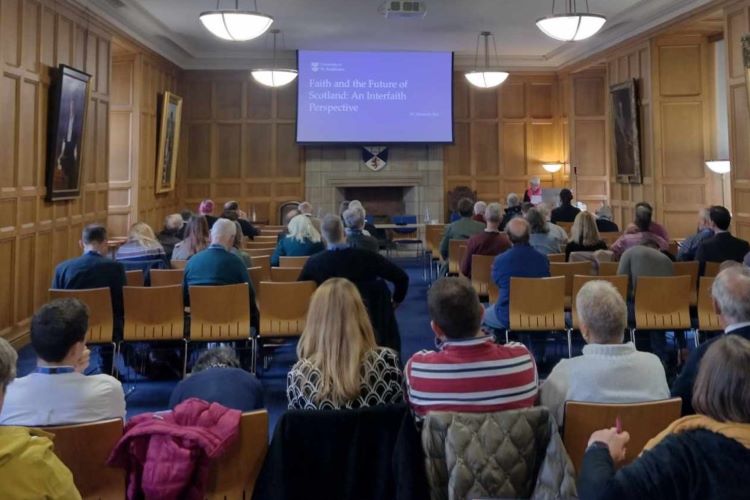Faith and the Future of Scotland

The School of Divinity hosted a day-long conference called ‘Faith and the Future of Scotland’ on Friday 27 September. It brought together academics, politicians, and working professionals to use their differing experiences and religious perspectives as a launchpad to have conversations across differences.
Along with having a series of important public conversations about the relationship between faith and politics in Scotland, the conference aimed to facilitate personal conversations between conference delegates and panelists through regular breaks where new connections could be made and conversations had.
Funding from Scotland’s Future Series made this possible, beginning the day with a time for conversations between people over coffee before two opening addresses from Vice-Principal Ester Ruskuc (Strategy, Policy, and Planning) and PhD Student at the School of Divinity and the conference organiser, David Stuart.
Dr. Jared Michelson (Gifford Fellow at the School of Divinity) then gave the first keynote talk of the day on the relationship between faith and secularism. This was followed by a panel discussion on the relationship between faith and policymaking between Assistant Vice-Principal (International) and MP for Arbroath and Broughty Ferry, Stephen Gethins, MSP for West Scotland, Ross Greer, and Chief Executive of the Humanist Society, Fraser Sutherland. The panel was chaired by Donald MacEwan, the University Chaplain.
After a coffee break, the Director of Interfaith Scotland, Dr. Maureen Sier, gave a second keynote talk on how faiths can work together in Scotland by uniting around common values. This was followed by two panel discussions on related themes. Bill Shackman (Assistant University Chaplain) facilitated the first conversation on the benefits and difficulties of having the right to freedom of religion and belief. This conversation took place between Professor of Religion and Politics at the School of Divinity, Mario Aguilar, MSP for Glasgow Shettleston and Convener of the Cross-Party Group on Freedom of Religion or Belief, John Mason, and Church Relations Lead for Open Doors UK&I, Chris Greenhalgh. The second panel discussion addressing how to dialogue across our differences was chaired by Fiona Stewart (Creative Director of Foolproof Creative Arts and regular contributor to BBC Radio Scotland and BBC Radio Four). The conversation took place between former Chief Strategist for Yes Scotland and Research Associate at Centre for Public Policy at the University of Glasgow, Stephen Noon, Honorary Pagan Chaplain at the University of St Andrews, Kitty Macintyre, and political theologian at the University of Aberdeen, Joel Pierce.
After addressing some of these more general questions on how to engage with each other across our differences, the latter part of the day turned to pressing concerns regarding health in Scotland and the possible responses of faith. The former Chief Medical Officer of Scotland, Sir Harry Burns, gave the final keynote speech on this topic, arguing that the fundamental issue of poor health in Scotland today is due to inequality and the adverse experiences this causes for many in society. The day then closed with a final panel discussion on the relation between faith and suffering, chaired by Lecturer in Practical Theology at the School of Divinity, Dr. Eric Stoddart. The conversation took place between the Buddhist Chaplain at the University of Edinburgh, Ani Rinchen, and the former Moderator of the General Assembly of the Church of Scotland and the current UK and Global Churches Ambassador for Christian Aid, Sally Foster-Fulton.
Throughout these conversations, the day aimed to discuss ways that faith and politics might have a fruitful relationship with each other that would lead to a flourishing future together for everyone in Scotland. As well as providing a space for rich conversations across our differences on the day itself, it has served as a conversation starter to inspire future conversations on related themes.
David Stuart, the conference organiser, communicated his gratitude to Scotland’s Future Series for funding the event, and to all the speakers and conference delegates for being part of the conversation. He commented that, ‘only through having conversations like this will we find ways of using our religious and political differences productively together that lead to a more equitable Scotland where everyone can experience a flourishing future together.’